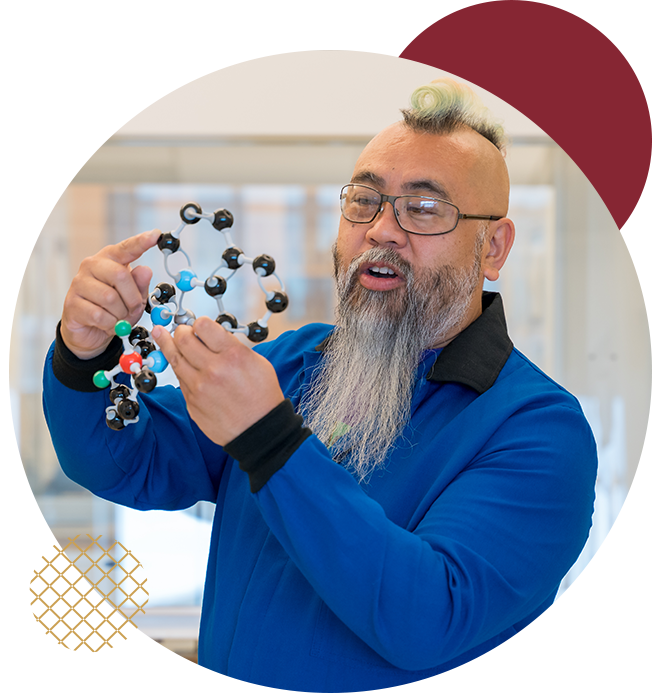College
Breaking the Mold
Ramapo’s New Science Dean Mixes Chemistry, Mohawks and Mission
By Mark Gregorio | Fall 2025

When Dr. Benny Chan enters a room, he seldom goes unnoticed. With a mohawk, beard and an easy laugh, Ramapo College’s new dean of the School of Theoretical and Applied Science doesn’t look like the typical chemist or academic leader. And that’s precisely the point.
“I’ve been mistaken for the help before,” Chan grinned. “But once people talk to me, they realize I’m intentionally challenging the norms.”
Chan, a first-generation college student from Lancaster, Pa., didn’t initially plan to become a scientist or a dean. He originally aimed for medical school, and after working as a chemist at Merck and feeling unfulfilled, he switched to graduate studies in chemistry at Penn State. There, he developed his expertise in inorganic chemistry and nuclear energy, along with his passion for access and student-centered mentoring.
From his new office at Ramapo College, Chan combines scientific rigor, social justice and style, where he envisions a future in which the sciences are accessible, engaging and deeply human.
Failure is the Process
A core motto for Chan—so much so that he jokes about embroidering it on his lab coat—is “Failure is the process.” For him, science is more than a series of correct answers; it’s an evolving journey. “Many students think science is about knowing everything,” he says. “But it’s about not knowing. Failing. Learning. Trying again. That’s where the real breakthroughs happen.”
Chan wants students, especially those from underrepresented or nontraditional backgrounds, to feel empowered to explore, make mistakes and grow. He focuses on creating opportunities for students from marginalized communities who might not have had the same science preparation as their peers.
Making Science Fun and Personal
Pop culture has helped make science more mainstream—think “Bill Nye the Science Guy,” “The Big Bang Theory” and even the classic 1980s film “Weird Science.” But Chan warns that accessibility often ends at entertainment. “Those representations are fun, but actual access is still lacking,” he explains. “Inner-city and low-income students don’t always have the lab time, exposure or support systems needed to succeed in college-level science.” That is where he believes Ramapo is different.
With a new STEM Center, tutoring programs and a focus on faculty-student collaboration, Chan aims to reshape how science is taught and learned, creating an environment where identity is celebrated and intellectual curiosity is rewarded.
He believes personality belongs in the lab just as much as precision. “Science is creative. It’s problem-solving. It’s even like video games. There’s that satisfaction when something clicks, the code runs or the experiment works.”
“Science is creative. It’s problem-solving. It’s even like video games. There’s that satisfaction when something clicks, the code runs or the experiment works.”
Dr. Benny Chan
Dean of the School of Theoretical and Applied Science
What’s Hot in Science Now?
Chan can rattle off a list of emerging fields in science: climate solutions; energy innovation; and human health.
“How do we take care of an aging population? How do we become less reliant on fossil fuels? These are applied science problems,” he says. “And our students are the ones who can solve them.”
He’s particularly proud of his own research on superconductivity, which explores materials that can conduct electricity without resistance. “It’s the kind of science that sounds like sci-fi but has real-world impact,” he says. Chan also spent time researching nuclear materials at Los Alamos National Laboratory, a place that, according to Chan, looked like “a Hollywood set from a Cold War spy movie.”
Looking ahead, Chan views artificial intelligence as a powerful tool and a warning. “AI can be transformative in science,” he says. “Big data analysis, predictive modeling—it’s changing the game. But it can also produce misinformation. Students need to learn how to use it wisely.”
At Ramapo, he wants to integrate AI thoughtfully into classrooms and labs, training students to use it not as a crutch, but as a springboard for deeper thinking.
Redefining Success
As he begins his first year as dean, Chan aims to spark meaningful conversations about equity, teaching methods and outcomes. Success, to him, isn’t just about GPAs or publications; it is about helping as many students as possible launch into careers in the sciences that have meaning and high impact on the world around them.
He asks, “Can we produce the next generation of scientists, doctors and researchers, especially at a place like Ramapo?” Chan is betting yes. And, with sleeves rolled up, science goggles on and a mohawk firmly in place, he’s ready to lead the charge.
